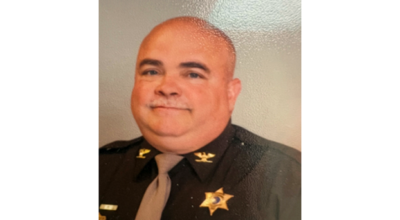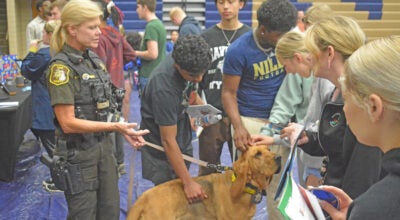The life of a chaplain
Published 11:06 pm Thursday, June 9, 2011

Joy Strand, Borgess-Lee Memorial Hospital administrator, and Terry Perkins, hospital chaplain since August 2009. (The Daily News/John Eby)
Chaplaincy “is a completely different animal,” according to Borgess Lee-Memorial Hospital’s, Terry Perkins.
Like firefighters or police officers, chaplains rush into harm’s way.
“The difference in the medical field is that often times when you run to a crisis scene, there are already 10 to 15 people there. Your job is to observe, have a presence and be available, if needed,” he said.
“You are in settings where you have to be comfortable with another person’s faith.
“How I understand it,” Perkins told Dowagiac Rotary Club Thursday noon at Elks Lodge 889, “To come along side of — to provide an observing and listening presence, free of expectation, judgment, condemnation, pre-conceived ideas or agendas, or corrective approaches.
“Rather, allow and promote open and honest expression in whatever form(s) it is manifested, in order to support the person in a holistic way. Chaplaincy isn’t for everyone. You do have to be an ordained minister, then you go a few more years because the work stereotypically deals with death and crisis. How many people want to have that as their job description?”
“Our approach to health and healing is not only healing the body, but also healing the spirit and the mind,” hospital Administrator Joy Strand said.
Strand commented, “Terry is of the Seventh-day Adventist faith now. It’s not a requirement to be a Catholic to be a chaplain in a Catholic faith hospital started by sisters. Previously, we had a vice president of mission integration, which is the person who helps organize our spirituality in our services. The one we have right now happens to be Catholic, but the one we had before was not Catholic. I really want people to understand that even though we are Catholic, it’s more about being faith-based and spiritual and honoring each person’s individual spirit.”
“Terry is an ordained Seventh-day Adventist minister since 1986 and he has been our chaplain at Borgess-Lee Memorial Hospital since August 2009. Dr. Charles Koudele and his wife, Betty, are Terry’s wife Elizabeth’s parents,” the Rotarian introduced her June 9 program.
Perkins, who is “transitioning” from Kiwanis to Rotary, has “four children, 15 chickens, three dogs, five cats and a horse.”
Perkins said “the nature of the beast for a minister” is to “want to be evangelistic. You want to proselytize and share your faith. That’s all normal in a pastoral setting. But in chaplaincy it’s completely different. If you have that tendency to do that, it’s probably not the field for you. You have to come into it with exactly this concept. Not everybody believes in God or is appreciative of clergy. The life of a chaplain is mediating between that expression of grief and high emotions that go with that and then somehow of having a presence there, observing and listening without making any judgment about what is happening with people. I hear things all the time at the time of death that from a theological standpoint, I don’t agree with, but I’m not there to agree with them or to correct them for what I think they should know. I’m there to celebrate their spiritual expression and help them in whatever way I can.”
Perkins quotes Romans 8:26: “Likewise the Spirit also helps in our weaknesses. For we do not know what we should pray for as we ought, but the Spirit Himself makes intercession for us with groanings which cannot be uttered.”
Or, a more modern translation: “In certain ways we are weak, but the Spirit is here to help us. For example, when we don’t know what to pray for, the Spirit prays for us in ways that cannot be put into words.”
Wikipedia defines a chaplain as a member of the clergy, such as a priest, pastor, rabbi or imam, or a lay representative of a religion attached to a secular institution such as a hospital, prison, military unit, police department, university or private chapel.
“I’ve been around death, as every minister is,” he said. “I’ve probably buried 100 people. The odd thing about that is I’ve only known about half of them.”
To become a chaplain requires four CPE units — clinical pastoral education, which requires a one-year internship.
Perkins did his at a large hospital in Saginaw. He also spent time in his native Chicago at Rush Presbyterian Hospital.
His job description for the 25-bed Dowagiac hospital is much more varied and detailed than at either of those larger facilities, where visitations alone consumed a 40-hour work week, such as the five floors assigned to him in Saginaw, from pediatrics to surgical intensive care.
“At large hospitals I was never included in administrative meetings or asked to be on committees,” compared to his schedule here with directors’ meetings the third Wednesday afternoon, standing meetings with the chief operating officer, or COO, the values committee at noon on the second Tuesday, the employee assistance fund as needed, orientation of new employees the second Wednesday and Cass County Ministerial Alliance (ACTION) on the first Thursday.
The values committee is tasked with enhancing patients’ and employees’ experience.
Ironically, this pace is what Perkins selected as his job leading to retirement in seven years.
He supplements his income by delivering handicapped-equipped buses all over the country, which is “a whole another story I’ll tell you about another time.”
Last week, around his work at the hospital, he found himself in both Las Vegas and New Hampshire.
“The difference is like night and day,” Perkins said. “It’s almost like not being a chaplain” after focusing entirely on patient visitation.
“In Saginaw, 10 or 12 people a week died in the hospital,” compared to 25 to 30 a year at Borgess-Lee. “I had one shift in Saginaw where five people died in eight hours. That was a night to remember.”
Can he give last rites?
“I will offer to the people I minister if there’s anything I can do for them,” Perkins replied. “We’re willing to step in if we can’t find a Catholic priest, and that’s the difference between chaplaincy and a parish pastor. You’re there to minister for the person’s faith, not your own. I may not believe in baptizing babies, but I’ve baptized babies because that was the need for the person. I have an excellent relationship with Father Kevin (Covert).”
“I think you’re uniquely qualified because you were raised Catholic and went to Catholic school,” offered President-elect Barbara Groner.
“It has meant a lot to our Catholic employees,” Perkins agreed. “Ash Wednesday, for example, I do ashes for those employees who would like it, but I’ve also called Father Kevin.”






